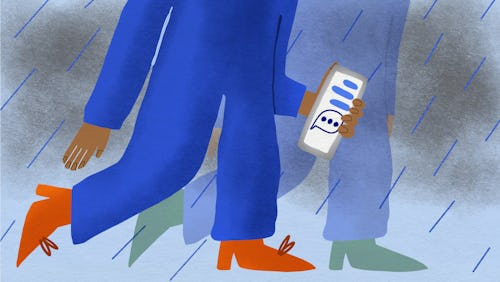
After our mutual breakup in 2019, my ex and I agreed to stay friends — and we did. Even though we lived in different countries, we G-chatted every few weeks and sent each other well wishes on birthdays and holidays. Then, about two years after the breakup, I sent him a G-chat that got no response. Thinking it may have been an oversight, I tried him again a few months later. No reply.
He had always gotten back to me within a day or two at most. I waited for weeks, half-expecting a delayed response. Still nothing.
It took me a while to come to terms with the fact that I’d been ghosted by my ex. After all, this wasn’t your typical ghosting scenario. Online discussions of ghosting are usually reserved for fuckboys on dating apps like West Elm Caleb, who love bomb and then disappear before a real relationship forms.
Being ghosted by my ex, though, felt equally distressing. In fact, it was almost like breaking up all over again. My thoughts spiraled as I wondered what his motivations were: Did he see something online or hear something from a friend that made him upset with me? Did he have a big epiphany that I’d been a bad girlfriend to him all along and didn’t deserve his friendship? Did he meet someone else, and if so, why would he let that get in the way of our friendship?
I wasn’t supposed to feel this way; we’d already broken up. Why did I even care? I knew we weren’t getting back together. Yet in a way, the ending of the friendship was harder than the breakup, because the breakup was amicable, and we’d communicated clearly about it. This, on the other hand, just left me feeling distant and confused. Maybe I’d failed to divorce my sense of self-worth from the attention of my ex, or maybe I was just sad to have lost a friend. Either way, it hurt.
Perhaps for some people, losing contact with an ex can feel inevitable, or even like a relief. But when you lose someone who’s been a constant installment in your life, even if the nature of your relationship has already shifted, it can also feel like a big loss, says Pennsylvania-based psychologist Jaime Zuckerman. “The connection was familiar and dependable,” she explains. “A sudden and unexpected termination of the friendship can feel like a betrayal and total disregard for the other’s feelings.”
On top of that, ghosting can bring up feelings of rejection, Zuckerman adds. “Except you not only feel rejected as a girlfriend or boyfriend, but also now as a friend.” For me, being rejected as a friend meant I couldn’t just write off the rejection as an instance of romantic incompatibility. I kept wondering if I was at fault.

That was how Brett Caton, a 29-year-old in Colorado, felt after an ex reached out to him after ghosting him during their relationship, started hanging out with him as friends, then ghosted him again. “I definitely felt rejected and confused, especially since I didn't know why I got ghosted,” he says.
When this happens, it’s helpful to remind yourself that your ex’s behavior isn’t about you, says Boston-based counselor Sam Nabil. “A person ghosts because they just don't know how to be upfront with their emotions,” he explains. “The ones who do the ghosting use it as a psychological tool to protect themselves. For them, it's easier to disappear rather than to undergo complicated relationship dynamics.” People may ghost because they have low self-esteem, are struggling with mental health, or have an insecure attachment style — that is, they’re afraid of losing someone, so they keep themselves at a distance, Nabil adds.
On the other hand, some people have valid reasons for ghosting their exes. Julia A., a 38-year-old IT professional in Indiana who prefered to stay anonymous for the purpose of discretion at work, ghosted her ex. She says it was because he’d told her he was never really into her but simply “was lonely and liked the attention,” she says. “So when we broke up and he wanted to be friends, I agreed, but when I thought about it, I didn’t really want to be friends with someone who would use another person like that.”
Ghosting an ex can also be a way to get a clean break, says New York City-based psychologist Michal Ben-Zvi Sommer. “Some people may simply feel that they need to move forward and leave the past behind,” she explains, adding that post-breakup ghosting can also indicate that the transition from partners to friends wasn’t working. “If you initiated the breakup, your ex may find staying in touch painful and triggering.” Someone might even think they have the tools to navigate a friendship initially, then realize it’s too painful for them once they experience what it actually entails (like, say, hearing about their ex’s dating life).
“In either case, the disappearing act doesn’t necessarily mean your ex has rejected you as a human,” says Sommer. “It could simply be that they aren't adjusting well to the friendship status, rejecting the new ‘terms and conditions.’”
Perhaps for me, my ex’s ghosting hit a nerve because our continued interactions had assured me that our relationship hadn’t “failed.” It had just shifted.
To avoid a situation like this, Sommer recommends remaining friends with an ex only if neither of you wants to get back together. And if your ex was like Brett’s and ghosted you already, be aware that if you stay friends, they could ghost you again.
If you’ve been ghosted by an ex — or anyone — Sommer suggests blocking out a few days to feel and talk about your feelings, then doing your best to get back into your life and focus on other things. And resist the urge to investigate what’s going on with your ex by snooping on their social media. “In addition to causing unnecessary pain, [this] can make letting go even harder,” says Sommer.
Perhaps for me, my ex’s ghosting hit a nerve because our continued interactions had assured me that our relationship hadn’t “failed.” It had just shifted. Staying friends made me feel like the love we had — and, in a weird way, love itself — was real and lasting. Maybe many of us keep exes at the periphery of our lives because the thought that it’s really over is too scary to accept. If it does end up reaching that point further down the line, though, we should offer ourselves the same compassion we did during the “real” breakup. Sometimes, breakups take years to complete.







